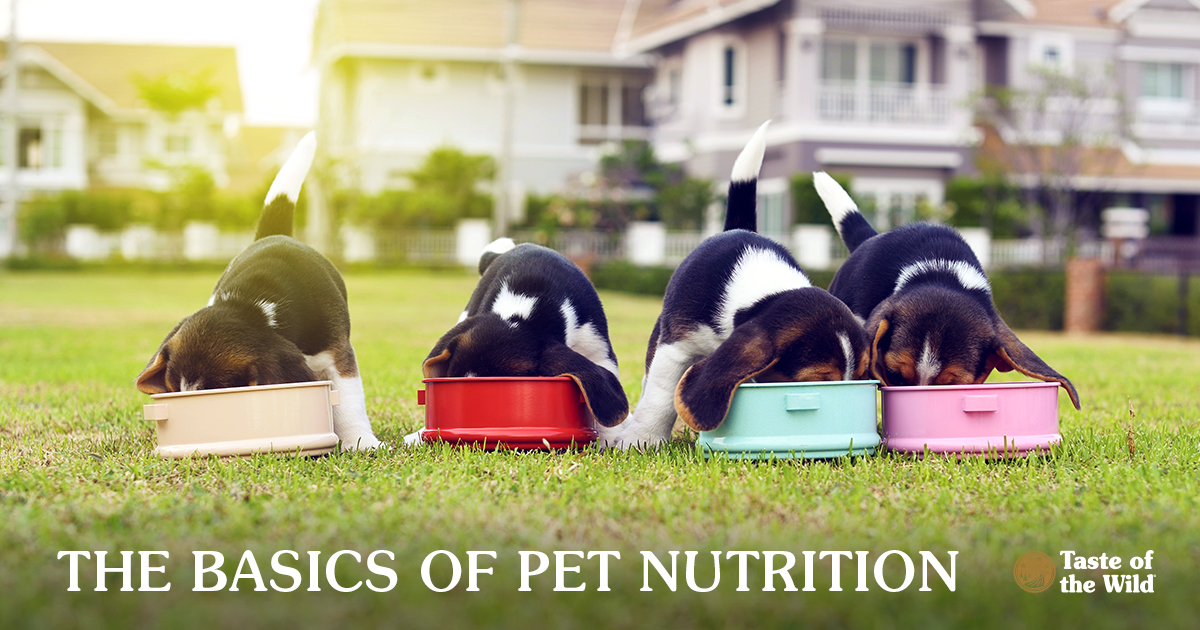
You want to do right by your pet. But pet food can be so complicated. What do the ingredients actually do? Does your cat need different nutrients than your dog? If you take vitamins, does that mean your pet should, too? The best way to get a foothold is to start learning some of the basics of pet nutrition.
1. All pets need dietary protein. Proteins serve as a source of energy and are made of amino acids that help your pet’s body perform normal biological functions. Of the 20 or so amino acids, 10 of them are considered essential for dogs while 11 are essential for cats. Essential amino acids are those that must be provided in the diet because pets can’t produce them in their own bodies or simply can’t make enough of them. Dietary proteins come from many different ingredients, including meat, fish and poultry.
2. Fats are the most concentrated energy source. Dietary fats typically come from animal fats and seed oils and are needed for proper cell structure and function. Fats provide essential fatty acids that aren’t produced in sufficient quantities by the body. And fats enhance the flavor and texture of food — which may be just what it takes to encourage that sick pet to eat.
Although fats don’t clog arteries in dogs and cats the way they can in humans, too much of them can be detrimental. Pets should not be fed table foods that are high in fat content, because sudden intake of high fat foods can trigger pancreatitis – a painful inflammation of the pancreas. Because fats are high in calories, another concern with feeding high fat foods or treats is obesity, especially in those couch-potato pets.
3. Carbohydrates help promote GI health. Carbohydrates include starches, sugars and fiber from well-known sources such as sweet potatoes, potatoes and peas, but also from lentils and garbanzo beans. In addition to providing energy, carbohydrates such as fiber help the digestive system work properly.
Extra fiber is added to some diets to help overweight pets feel full so they’re less tempted to beg for more or scavenge for snacks. Your veterinarian may suggest supplemental fiber for your pet to help maintain healthy stool consistency. Plain canned pumpkin is commonly recommended.
4. Cats are obligate carnivores. Remember those amino acids found in proteins? Two that are especially important for cats are taurine and arginine. Taurine deficiencies in cats can lead to blindness, heart failure, deafness and birth defects. Without arginine, cats have difficulty removing ammonia from the body, leading to drooling, vomiting, convulsions and even death.
Because plants can’t provide enough of the required amino acids for cats, our feline friends usually can’t survive on vegetarian diets without additional supplementation of amino acids. In fact, adult cat foods need to have a minimum of 26 percent protein (dogs, by contrast, require 18 percent protein), and some of the amino acid requirements for cats are twice those for dogs. This is why cats should never be fed dog food.
5. Cats are usually lactose intolerant. Despite all the storybook images of cats lapping up cream, cow’s milk can be difficult for most kitties to digest. They generally lack sufficient amounts of lactase, the enzyme that enables them to digest milk. While some cats may be fine with milk, it may cause vomiting or diarrhea in others.
6. Proteins are the cause of most food allergies. Even so, a 2016 study by BMC veterinary research showed that the prevalence of food allergies in all pets who visited veterinarians was between one and two percent. If your pet is itchy, it’s more likely to be caused by fleas or environmental allergies.
7. Pets typically don’t need extra vitamins. If your pet food label says that the diet was formulated to meet the Association of American Feed Control Officials (AAFCO) nutrient profile for your pet’s life stage, or that it has passed animal feeding trials, the diet should be complete and balanced with all the vitamins and minerals your pet requires.
If your pet has any health conditions — even if your dog or cat is just a bit pudgy — ask your veterinarian for dietary recommendations. He or she can steer you toward the best food for your pet.
The information in this blog has been developed with our veterinarian and is designed to help educate pet parents. If you have questions or concerns about your pet's health or nutrition, please talk with your veterinarian.
